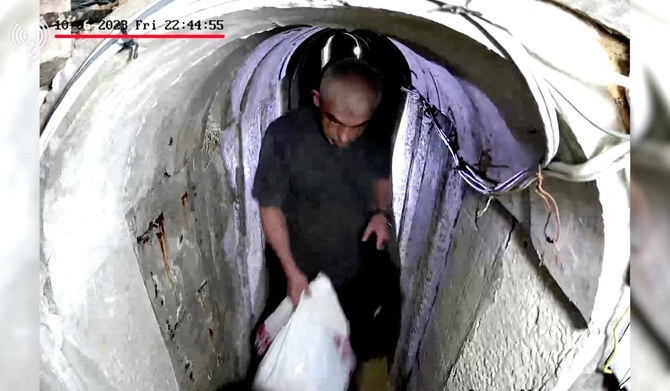PARIS: Slain Hamas leader Yahya Sinwar was seen as a key obstacle to any agreement on the Israeli hostages seized during the October 7 attack that he orchestrated.
With his group plunged into a leadership vacuum by his death, the future of hostage negotiations appears to have become even more complicated.
Hamas now needs to appoint a replacement, and that person will play a key role in determining the fate of the Israelis kept hostage since its attack on October 7, 2023.
Of the 251 hostages taken to the Gaza Strip that day, 97 are still being held there, including 34 who the Israeli army has confirmed are dead.
Negotiations for their release are led by Israel’s intelligence services, with the help of the United States, Egypt and Qatar.
But that task will be no easier with Sinwar gone, analysts said.
“The hostages’ fate may now be sealed for the simple reason that there is no one left to negotiate their release,” said Karim Mezran, a Middle East expert at the Atlantic Council think tank.
US intelligence believed “Sinwar’s stance had hardened in recent weeks, leading American negotiators to believe that Hamas was no longer interested in reaching a ceasefire or hostage agreement,” said the New York-based Soufan Center.
So “any forthcoming negotiations can also serve as a litmus test for Hamas’s operational capacity in the post-Sinwar era,” the think tank added.
While the families of the hostages welcomed Sinwar’s killing, they also expressed “deep concern” about those still held captive.
“We call on the Israeli government, world leaders, and mediating countries to leverage the military achievement into a diplomatic one by pursuing an immediate agreement for the release,” the Hostages and Missing Persons Families Forum said on Friday.
Part of the problem lies in how Hamas is no longer the ultra-hierarchical organization it was when it carried out the October 7 attack which sparked the Gaza war.
Decimated and scattered by Israel’s offensive, and with the Gaza Strip cleaved in two by the Israeli army, today the militant group “operates in very localized cells, in a much more decentralized way,” researcher David Khalfa at the Fondation Jean-Jaures think tank told AFP.
Hamas “is now more of a militia with local warlords” that has links with “families which apparently are holding hostages,” he said.
That “is going to be a real problem for the Israelis and the Americans. Rather than a blanket agreement on the hostages, they will probably aim for releases bit by bit,” Khalfa said.
Until the middle of 2024, Hamas’s structure was split in two: on the one hand, the political branch led by Ismail Haniyeh, based in the Qatari capital Doha, and the paramilitary branch led by Sinwar in Gaza on the other.
Sinwar rose to become the overall leader of Hamas after Haniyeh was assassinated in July.
The balance of power between the two is now tilted toward the political bureau, “where the sources of funding, logistical support and militia training are concentrated,” Khalfa said.
If it chooses a leader in exile, the group runs the risk of seeing its new chief alienated from its forces on the ground in the Palestinian territories.
But if it appoints a fighter such as Sinwar’s brother Mohammed, Hamas will be signalling it has less interest in a political resolution to the war.
Hostage negotiations are now in unchartered territory.
“Prior negotiating efforts were all based on the idea that Sinwar had a line of connection to most of those holding hostages, and he could shape their actions,” Jon Alterman of the US think tank CSIS said.
“The picture is much murkier now, and we are likely to see a diverse array of outcomes,” he said.
There are even fears the hostages could be executed, perhaps in revenge for Sinwar’s killing or because the militants feel they can no longer sell the hostages for cash.
With no one in the group “willing to take the deadly risk of looking after them... the hostages may be left to their own devices and able to escape,” Mezran said.
“The fear is also that mid-level Hamas operatives may be tempted to eliminate the hostages to protect their own identities from the eventual retaliation of Israeli forces.”
The pressure on Israeli Prime Minister Benjamin Netanyahu is enormous, but his government does not appear prepared to secure the hostages’ release at any price.
It will not have forgotten the 2011 release of more than 1,000 Palestinian prisoners in exchange for Israeli soldier Gilad Shalit, held hostage by Hamas for five years.
Among the Palestinians freed was Sinwar himself.
“They want to get away from the Shalit precedent, which was a mistake they paid a high price for,” Khalfa said.




























